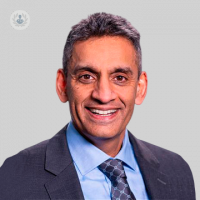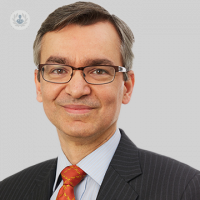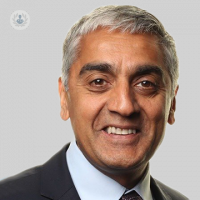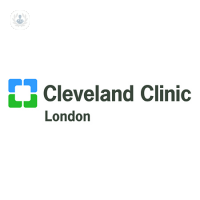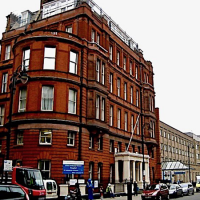What is an echocardiogram?
An echocardiogram is a non-invasive, painless ultrasound scan carried out to create an image of the heart. The exam uses ultrasound waves to view the structure and examine the functionality of the heart, including the chambers, valves, cardiac muscle and adjoining blood vessels.

What does an echocardiogram involve?
An echocardiogram is a non-invasive diagnostic tool that allows the doctor to examine the chambers of the heart and connecting blood vessels, providing useful information on your heart’s general state of health and on any potential cardiopathies.
It usually lasts 10-15 minutes, during which you’ll need to be very still. You will have to take your shirt off and lie down on a flat bed. A special gel will be applied on your skin and then some electrodes will be placed on your chest. A probe or transducer will be then placed on your chest and, thanks to the ultrasound waves the probe emits, the doctor will have a clear picture of your heart and surrounding structures.
What is an echocardiogram for?
An echocardiogram is done to get more information about your heart’s pumping strength, the condition of the valves and the blood flow to the heart’s cavities. It can be carried out in several different ways:
- Transthoracic echocardiogram – the transducer is placed on your chest, emitting ultrasound waves which will give a real time picture of your heart
- Transesophageal echocardiogram – it is done by endoscopy and it can identify conditions that are otherwise hard to diagnose, such as complex valvular defects, rare congenital malformations or conditions of the thoracic aorta
- Three-dimensional echocardiography – enables detailed anatomical assessment of the heart
You may require an echocardiogram if:
- You’ve had a heart attack
- You suffer from heart failure
- Your heart valves are damaged
- You’ve had an artificial heart valve implanted
- You were the recipient of a heart transplant
What does it feel like during the procedure?
You won’t feel any pain or discomfort as the procedure is completely painless and safe.
11-13-2012 07-28-2023Echocardiogram
Dr Alessandro Giardini - Paediatric cardiology
Created on: 11-13-2012
Updated on: 07-28-2023
Edited by: Sophie Kennedy
What is an echocardiogram?
An echocardiogram is a non-invasive, painless ultrasound scan carried out to create an image of the heart. The exam uses ultrasound waves to view the structure and examine the functionality of the heart, including the chambers, valves, cardiac muscle and adjoining blood vessels.

What does an echocardiogram involve?
An echocardiogram is a non-invasive diagnostic tool that allows the doctor to examine the chambers of the heart and connecting blood vessels, providing useful information on your heart’s general state of health and on any potential cardiopathies.
It usually lasts 10-15 minutes, during which you’ll need to be very still. You will have to take your shirt off and lie down on a flat bed. A special gel will be applied on your skin and then some electrodes will be placed on your chest. A probe or transducer will be then placed on your chest and, thanks to the ultrasound waves the probe emits, the doctor will have a clear picture of your heart and surrounding structures.
What is an echocardiogram for?
An echocardiogram is done to get more information about your heart’s pumping strength, the condition of the valves and the blood flow to the heart’s cavities. It can be carried out in several different ways:
- Transthoracic echocardiogram – the transducer is placed on your chest, emitting ultrasound waves which will give a real time picture of your heart
- Transesophageal echocardiogram – it is done by endoscopy and it can identify conditions that are otherwise hard to diagnose, such as complex valvular defects, rare congenital malformations or conditions of the thoracic aorta
- Three-dimensional echocardiography – enables detailed anatomical assessment of the heart
You may require an echocardiogram if:
- You’ve had a heart attack
- You suffer from heart failure
- Your heart valves are damaged
- You’ve had an artificial heart valve implanted
- You were the recipient of a heart transplant
What does it feel like during the procedure?
You won’t feel any pain or discomfort as the procedure is completely painless and safe.
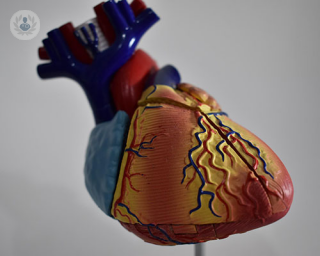

How to prepare for an echocardiogram
By Dr Malcolm Burgess
2024-12-30
An echocardiogram is a quick and painless test that can help diagnose various different heart conditions. In his latest online article, highly-knowledgeable cardiologist Dr Malcolm Burgess explains everything you need to know about preparing for an echocardiogram. See more


What can an echocardiogram detect?
By Dr Paramjit Jeetley
2024-12-30
An echocardiogram is a highly effective and efficient scan of the heart, which can detect a number of different underlying and potentially serious heart-related complications. On hand to provide us with a detailed, expert analysis of echocardiograms is highly experienced consultant cardiologist, Dr Paramjit Jeetley. See more
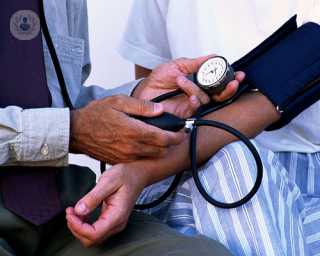

5 ways to diagnose high blood pressure
By Dr Ahmed Elghamaz
2024-12-30
Hypertension is very common in our society. By the age of 60 half of our population has high blood pressure. It’s important to keep a check on your current blood pressure level because it can change with time. Leading cardiologist Dr Ahmed Elghamaz explains... See more
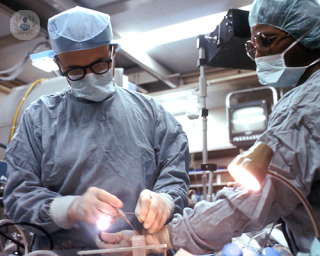

Exploring transcatheter aortic valve implantation (TAVI)
By Dr Mohamed Farag
2024-12-30
Transcatheter aortic valve implantation (TAVI), or TAVR, is a minimally invasive procedure used to treat aortic valve stenosis, a condition in which the aortic valve becomes narrowed, restricting blood flow from the heart to the rest of the body. Leading consultant interventional cardiologist Dr Mohamed Farag takes an in-depth look at TAVI and addresses some common questions patients may have about this procedure, in this article. See more
Experts in Echocardiogram
-
Dr Rajan Sharma
CardiologyExpert in:
- Echocardiogram
- Coronary heart disease
- Valvular heart disease
- Heart failure
- Hypertension (high blood pressure)
- Palpitations
-
Mr Masood Khan
CardiologyExpert in:
- Valvular heart disease
- Echocardiogram
- Chest pain
- Hypertension (high blood pressure)
- Heart failure
- Pacemaker
-
Professor Sanjay Sharma
CardiologyExpert in:
- Sports cardiology
- Dilated cardiomyopathy
- Sudden death
- Hereditary diseases
- Echocardiogram
- Heart failure
-
Dr Andrew Deaner
CardiologyExpert in:
- Cardiovascular disease
- Coronary angioplasty
- Echocardiogram
- Pacemaker
- Palpitations
- Heart failure
-
Dr Alessandro Giardini
Paediatric cardiologyExpert in:
- Chest pain
- Heart murmur
- Palpitations
- Syncope
- Echocardiogram
- Congenital heart disease
- See all

Cleveland Clinic Moorgate Outpatient Centre
Cleveland Clinic Moorgate Outpatient Centre
55 Moorgate, EC2R 6BH
No existe teléfono en el centro.
By using the telephone number provided by TOP DOCTORS, you automatically agree to let us use your phone number for statistical and commercial purposes. For further information, read our Privacy Policy
Top Doctors

London International Patient Services (LIPS)
London International Patient Services (LIPS)
5 Devonshire Place, W1G 6HL
No existe teléfono en el centro.
By using the telephone number provided by TOP DOCTORS, you automatically agree to let us use your phone number for statistical and commercial purposes. For further information, read our Privacy Policy
Top Doctors

Great Ormond Street Hospital
Great Ormond Street Hospital
Great Ormond Street. WC1N 3JH
No existe teléfono en el centro.
By using the telephone number provided by TOP DOCTORS, you automatically agree to let us use your phone number for statistical and commercial purposes. For further information, read our Privacy Policy
Top Doctors
-
Cleveland Clinic Moorgate Outpatient Centre
55 Moorgate, EC2R 6BH, Central LondonExpert in:
- Digestive
- Cardiology
- Dermatology
- Diagnostic Imaging
- Diagnostics
- Obstetrics and Gynaecology
-
London International Patient Services (LIPS)
5 Devonshire Place, W1G 6HL, W1G Marylebone LondonExpert in:
- Orthopaedic spinal surgery
- Plastic surgery, reconstructive and aesthetics
- Hand and wrist
- Otolaryngology
- Foot and ankle
- Knee
-
Great Ormond Street Hospital
Great Ormond Street. WC1N 3JH, Central LondonExpert in:
- Cancer
- Paediatric neurosurgery
- Paediatrics
- Most viewed diseases, medical tests, and treatments
- Narcolepsy
- Snoring
- Polysomnography (sleep study)
- Alzheimer's disease
- Chronic headache
- Electrophysiology study
- Autoimmune diseases
- Joint pain
- Nutrition
- Genetic testing

